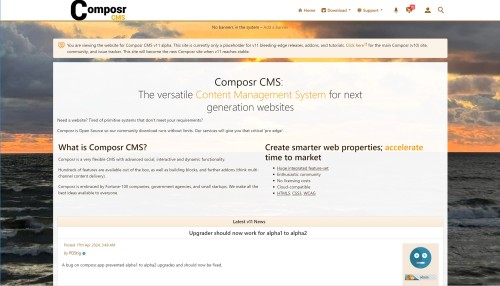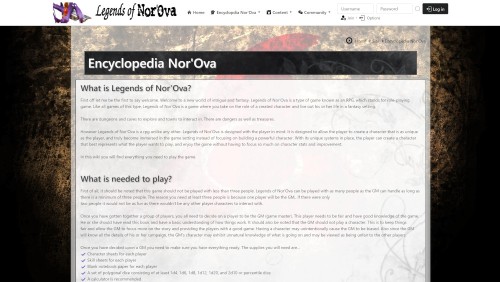Featured Sites: A-Z Index
H
Newest 10 Entries
| Question | What resources are available to help me navigate these legal and social challenges? |
|---|---|
| Answer | Composr offers various resources, including tutorials on accessibility, staff management, and general website dos and don'ts. You can also consult external resources like the COPPA website and Wikipedia for more in-depth information on specific laws and regulations. Remember that seeking legal counsel may be necessary for complex situations. |
| Question | What are some social considerations for running a website with community features? |
|---|---|
| Answer | Managing a community involves addressing social issues like child protection, free speech, discrimination, and abuse. Establish clear policies on these matters, including content moderation guidelines and procedures for handling feedback. Consider the diverse personalities and potential vulnerabilities of your users. |
| Question | What are my legal responsibilities regarding illegal content posted by users? |
|---|---|
| Answer | While "safe harbor" laws offer some protection, you are still obligated to take down illegal content upon becoming aware of it. Implement measures like content checks, clear rules prohibiting illegal uploads, and liability disclaimers. The level of responsibility varies depending on the severity of the content, from copyright infringement to more serious criminal content. |
| Question | What steps should I take to make my website accessible? |
|---|---|
| Answer | Website accessibility is essential for inclusivity and may be legally required under anti-discrimination laws. Composr is designed to meet high accessibility standards, but you need to maintain this when creating content or modifying templates. Following WCAG guidelines is crucial, and you can find more information in the accessibility tutorial. |
| Question | How can I ensure my website complies with email marketing laws? |
|---|---|
| Answer | Email marketing laws like CAN-SPAM protect recipients' rights to unsubscribe. Your website must include a clear 'List-Unsubscribe' header in every email, offer an easy unsubscribe process, and respect unsubscribe requests promptly. Composr provides built-in mechanisms, including an unsubscribe endpoint and support for the List-Unsubscribe header, to facilitate compliance. |
| Question | What are my responsibilities regarding user privacy? |
|---|---|
| Answer | You must have a comprehensive privacy policy that details the personal data you collect, its usage, and if it's shared with third parties. Laws like GDPR have strict requirements, including logging data access, data purging, and security measures. California law mandates specific elements in your policy, like handling "Do Not Track" requests and a clear process for communicating changes. Composr has an automatic Privacy Policy generator block to help you get started. This is used by default. |
| Question | How can I create effective website rules? |
|---|---|
| Answer | A well-defined rules page is crucial for setting expectations for user behavior and outlining consequences for violations. It should cover a range of offenses with appropriate punishments, reference relevant laws, and assign legal responsibility to users. Composr provides default rules pages that can be customized, and this page is displayed to users upon joining the site. |
| Question | What are the key legal considerations for running a website? |
|---|---|
| Answer | Several legal aspects need careful attention when operating a website, especially for large or corporate sites. These include establishing clear rules and terms of service, adhering to privacy laws like GDPR and California's regulations, managing personal data responsibly, complying with email marketing regulations like CAN-SPAM, ensuring website accessibility, addressing eCommerce regulations, and understanding liability for content and user actions. |
| Question | How do data-tpl and data-view behaviors work in Composr's JavaScript? |
|---|---|
| Answer | Composr uses data-tpl and data-view behaviors for associating HTML templates and JavaScript views, respectively. This facilitates clean separation of presentation and logic:
|
| Question | What are the advantages of using Composr's JavaScript libraries? |
|---|---|
| Answer | Composr's JavaScript libraries like $cms, $util, and $dom offer several advantages:
|
Top 10 Entries
| Question | What are the different ways to track events in Composr? |
|---|---|
| Answer | Composr offers various methods for tracking events:
The JavaScript and HTML data attribute methods can also be integrated with Google Analytics events. |
| Question | How do I install geo-location data for Composr statistics? |
|---|---|
| Answer | Geo-location data installation is usually automatic during the Composr installation process. If not, you can manually install it by navigating to Admin Zone > Audit > Site statistics > Install geolocation data. This action will reschedule the installation task. If you don't see this option, the geo-location data is already installed. |
| Question | What are the key differences between Google Analytics and Composr statistics? |
|---|---|
| Answer | While there is some overlap, Composr statistics and Google Analytics are complementary tools. Google Analytics Pros:
Google Analytics Cons:
Composr Statistics Pros:
Basic users may find Composr statistics sufficient, while expert marketers might prefer the power of Google Analytics. |
| Question | What tools and strategies can be used for staff training and development? |
|---|---|
| Answer | While Composr itself doesn't provide built-in training features, several approaches can be used for staff development:
By investing in ongoing staff training and development, communities can ensure their teams possess the necessary knowledge and skills to perform their roles effectively and contribute to the platform's overall success. |
| Question | How can potential conflicts between staff members be avoided (regarding content moderation)? |
|---|---|
| Answer | Composr incorporates "conflict detection" features to prevent staff from accidentally overwriting each other's work. When multiple staff members attempt to edit the same resource simultaneously, a warning message appears, prompting communication and coordination. Open communication and transparency are crucial. Encourage staff to share their ongoing tasks and plans with each other to prevent overlaps and potential conflicts. Utilizing shared tools like the staff checklist and private forums can further facilitate coordination. |
| Question | What should be considered when assigning roles and responsibilities to staff? |
|---|---|
| Answer | When assigning roles, it's recommended to start new staff with limited responsibilities and gradually increase their authority based on performance and dedication. This fosters a sense of progression and prevents discouragement among existing staff. Always consider the individual's skills and interests when assigning tasks. For example, someone with strong writing skills might be well-suited for managing content creation, while a technically-minded person could excel at site maintenance. |
| Question | How can staff be effectively managed in a Composr community? |
|---|---|
| Answer | Successful staff management requires a mindful approach that prioritizes fostering a positive and productive environment. Key recommendations include:
By fostering a supportive and empowering environment, community managers can enable staff to contribute their best efforts and drive the community's success. |
| Question | How should staff members be chosen for a Composr-based online community? |
|---|---|
| Answer | Choosing staff for online communities differs from traditional hiring processes due to factors like unpaid positions, varying time commitments, and remote interactions. Focus should be placed on identifying individuals with:
|
| Question | How can content issues be reported and addressed by staff? |
|---|---|
| Answer | Composr's content reporting system, powered by the Tickets addon, allows users to report problematic content to staff. Key features include:
This system ensures efficient handling of content issues, allowing staff to address concerns effectively while maintaining a transparent record of actions taken. |
| Question | How can staff members collaborate effectively in Composr? |
|---|---|
| Answer | Composr offers various tools to facilitate staff collaboration:
|








